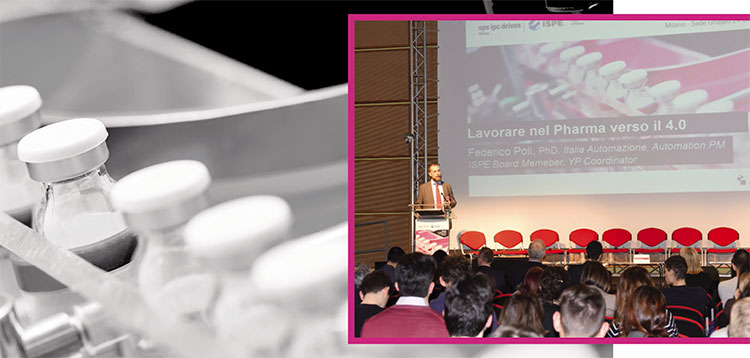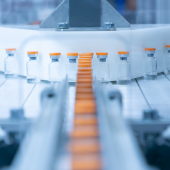Pharma 4.0: challenges and opportunities
The “Pharma 4.0 round table: excellent processes and enabling technologies for the future of the Italian pharmaceutical industry “(Milan, 26 February) was one of the stages in the approach SPS Italia 2019, the principal fair for automation technologies of Messe Frankfurt Italia, which organized the event in collaboration with ISPE - the largest global non-profit association dedicated to pharmaceutical and life sciences professionals, with a vision oriented to the interaction between 4.0 enabling technologies and the “Operational Excellence” movement.

Almost 300 professionals in the sector including companies, end users, representatives of the academic world were present at the event, who were welcomed by Francesca Selva (Vice President of Marketing & Events Messe Frankfurt Italia).
• In her two interventions, Teresa Minero (Chair Italy, EU Leadership Team, Pharma 4.0 ISPE Steering Committee, LifeBee Founder & CEO) underlined how the Italian pharmaceutical industry was, in 2017, the number 1 in Europe for turnover (€ 31.2 billion, 79% of which is exported). The sector is very sensitive to innovation: in fact, as many as 90% of its companies are starting Industry 4.0 programs.
«Pharma 4.0 does not only mean new machines in production and automation, but also, and aboveall, many different easy-to-use enabling technologies, integrated and shared information flows, revised processes (from static to wise control) and processes in continuous evolution, not to mention mental openness to change. Hence the urgent need for new skills» explains Minero, who concluded: «If it is important to train young people to create the new professional profiles necessary for 4.0, it is even more important to do so with the figures with more experience and the managers, who are the decision makers regarding investments».
• Cesare Maria Joppolo, Professor of the Energy Department of the Milan Polytechnic, highlighted how the pharmaceutical industry struggles daily against air and water contaminants, which undermine the quality of production. Industry 4.0 is a valid aid in this field, as it enables the creation of more effective and efficient temperature and humidity control systems, obtaining a continuous and precise measurement of contaminants; the use of robots/cobots enables a better control of the release of contaminants, limiting the permanence of people in the aseptic areas. The introduction of digital technologies favors the evolution of intelligent, connected, “green” and personalized products for the patient. Joppolo lastly announced a new master’s degree in Food Engineering, also hoping for the realization of one in Pharma Engineering.
• Giuseppe Recchia, Director and Vice President of the Smith Kline Foundation, spoke about how the pharmaceutical product is being transformed thanks to digitalisation, the modernizing of clinical trials or using old pharmaceutical products in new treatments. «A new therapeutic category is represented by Digital Therapeutics, whose “active principle” is represented by a software with learning skills (machine learning), able to interact with the patient through apps, serious games, devices or other».
• «People determine the success of an initiative; hence one need work on people’s mentality! ». This was the essence of the talk given by Menarini Corporate Demand Manager Davide Smaldone’s, who spoke about the company’s journey to Industry 4.0: a long journey, to be done in stages, so we must first define the objectives by focusing only on what is needed, building synergies between the departments, choosing the people who need to implement the change, exchanging information especially transversally. Two the essential qualities: be as agile as possible and learn from the mistakes made».
The benefits? Greater efficiency in production, better process control, better quality thanks to the reduction of deviation management times, satisfaction of those working on higher value-added activities, decisions being easier to make, thanks to more information available in real time thanks to better operating tools.
• Gian Mauro Brozzi (M&Q IT/Process Automation Director Sesto Fiorentino and Global Data Integration and Analytics Eli Lilly and Company) emphasized the advantages obtained in the company with digitization: «The more you examine the data, the more you make the right decisions: however, the data you require needs to be correctly collected. Here a firm, basic knowledge of both traditional and digital technology is required and you have to know how to make it work. In Lilly - he concluded - we have decided to favour the policy of small interventions rather than large ones ».
• Rachele Donati, Talent Acquisition and Development Manager of Lilly Italia illustrated the skills now required to work in the Pharma field and how Lilly works to successfully encounter the professionals it needs in order to tackle digitization.
• Enabling technologies were also discussed by ABB, Schneider Electric, Porsche Consulting, Lenze, B&R, Rockwell Automation, Phoenix Contact, Mitsubishi Electric Europe, Oracle and Beckhoff Automation, summarizing the solutions implemented in this field.
In conclusion
Moderated by Milan Polytechnic Professor Giambattista Gruosso, a round table was also held, which saw the participation, among others, of the philosopher Franco Bolelli - who spoke on the socio-cultural aspects linked to the extension of lifespan - and Federico Poli from ISPE Young Professionals, who illustrated his work experience in the field of Pharma 4.0.
During the debate it emerged how to facing the digital transformation requires the development of transversal and soft skills, such as the ability to become passionate about challenges, work in teams for problem solving, have economic sensitivity and be open minded, a feature that not only applies to the new generations, but also to those already active in the company, who also need to enhance their digital talent.
di Maurizio Cacciamani



















